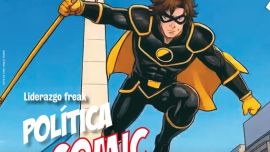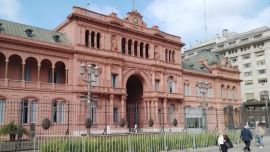The government’s ongoing conflict with the Supreme Court hit new heights this week after a controversial ruling by the nation’s highest tribunal that suspended gubernatorial elections in the provinces of San Juan and Tucumán, where Peronist victories were expected.
The decision immediately divided the political class along party lines, with the opposition celebrating the court’s decisive action against so-called “feudal chieftains,” while Frente de Todos’ leadership took the opportunity to “confirm” their belief in ‘lawfare’ and declare political persecution against Peronism.
It was a high-stakes week for the Supreme Court, with its chief justice, Horacio Rosatti, attending the AmCham Summit where he criticised “uncontrolled money-printing” in a direct blow at the government. It was an unusual intervention for the former justice minister, who rarely makes public statements, directing his disapproval at economic and monetary policy, which is clearly beyond the scope of the Judiciary.
His comments came shortly before the decision on the provincial elections was released, and as the hardliners in the government held another session of the impeachment of the Supreme Court justices in Congress.
In an impromptu ‘Cadena Nacional’ nationwide broadcast on Wednesday, President Alberto Fernández said that injunctions would be incorporated into the ongoing impeachment of the Supreme Court justices while exhorting Congress to approve the expansion of the top tribunal.
"I cannot ignore that this decision affects two provinces where a Peronist triumph is projected, joining other government victories last Sunday. Nor can I fail to observe that this ruling comes immediately after [former president] Mauricio Macri called the northern provinces where his party is expecting defeat feudal," declared the Frente de Todos leader.
"The Supreme Court has shown once again that it fits its decisions to the political needs of the opposition, thus again demonstrating its anti-democratic character and its profound disdain for the federal regime governing us,” he added dramatically.
The president considered that the suspension of the elections "leaves democracy as the hostage of a group of justices who do not observe judicial criteria while the investigation being pursued by the Congress Impeachment Committee shows them to be ever more implicated in severe administrative irregularities and manoeuvres serving the opposition.
If the top tribunal of the country does not respect the separation of powers, compulsively steamrollers federalism and provincial autonomy and goes against one of the supreme rights of the citizen in democracy which is the popular vote, then the justice of this republic has been degraded."
The nationwide broadcast further included in its reproaches two of the Supreme Court justices being decreed by Macri, the “scandal” of Lago Escondido, the battle over the Council of the Magistrates and the federal revenue-sharing dispute with the City of Buenos Aires.
Opposition glee
The main leaders of Juntos por el Cambio rushed to celebrate the decision, suspending the elections in Tucumán and San Juan while also aiming their criticism at provincial Peronism.
"Nobody is above the Constitution, that’s the fundamental rule of our republic. The [Supreme] Court decision corresponds to a country which respects legality. These attempts violate provincial electoral rules in the pursuit of perpetual power must be abandoned forever," tweeted Buenos Aires City Mayor and presidential hopeful, Horacio Rodríguez Larreta.
Meanwhile his rival for the opposition nomination Patricia Bullrich used the same social network to say: "We put the brakes on the re-re-elections of [Juan] Manzur and [Sergio] Uñac. They believe themselves to be feudal chieftains and owners of their provinces. They wanted to violate their own constitutions and the Supreme Court put them in their place. This won’t be happening with us [in power]. Those who violate the law are always going to have problems with judges. [Supreme] Court rulings are heeded, not discussed. Anything else is coup-mongering."
Macri backed the move, rubbishing the government repudiation as "not tolerating that a branch of government sets limits to them. As always, one of the most depressing aspects of these episodes is the reaction of the government and especially President Fernández. They not only criticise the ruling but also the legitimacy of the [Supreme] Court to decide. This decision places a limit on the abuse of power in provinces whose system of government has been described as ‘feudal ' due to the almost absolute power accumulated by their governors," he posted on Facebook.
Finally, deputy María Eugenia Vidal commented: "The dollar at 470 pesos, annual inflation at 104.3 percent and poverty 39 percent [of the population] and what does the president do? Deliver a nationwide broadcast threatening the justices of the Supreme Court."
Uñac responds
Uñac questioned the suspension of gubernatorial voting in his province and Tucumán but said that he would heed the ruling.
“I understand that it is inconsiderate towards the people of San Juan to suspend the election four days beforehand when they have made a very important economic and institutional effort towards bringing forward the electoral process and inconsiderate to allow more than 30 days to go by before making a decision,” he said in a televised broadcast.
Uñac said that the main victims are the people of San Juan, who will not be able to elect their governor and lieutenant-governor. The two-term governor had been seeking a third spell in office after previously being lieutenant-governor under José Luis Gioja between 2011 and 2015.
On April 11, Evolución Liberal gubernatorial candidate Sergio Vallejos had impugned Uñac’s candidacy with the Supreme Court after exhausting all the provincial instances which had turned him down. The justices then asked the Attorney-General for his opinion, who on April 13 cleared the magistrates to decide on the challenge to Uñac’s bid for a second re-election, thus permitting the Supreme Court to intervene in provincial justice.
Vallejos, whose challenge was based on Uñac’s term as lieutenant-governor, had called for the entire election to be suspended should the tribunal be unable to rule before next Sunday. According to the Supreme Court, the San Juan Provincial Court had misinterpreted Article 175 of the provincial constitution: "The governor and lieutenant-governor will serve four years and may be re-elected up to twice consecutively."
Uñac knew that his candidacy could be challenged by the Supreme Court but hoped that it would slip by unnoticed by a tribunal facing the pressures of impeachment. He had also been hoping that refraining from participating in that drive would be read as a positive message from the justices.
Manzur challenge
Manzur was seeking to continue as lieutenant-governor on a ticket headed by Osvaldo Jaldo but this was challenged by Germán Alfaro of the dissident Peronist Justicia Social party, who pointed out that Manzur had been lieutenant-governor under José Alperovich from 2017 to 2015 and governor since then, adding up to a total of four terms.
Alfaro’s objections were rejected by provincial justice, causing him to go to the Supreme Court, which interpreted the provincial constitution as saying that only one consecutive term was possible, whether for governor or lieutenant-governor. That constitution reads: “If the governor has been re-elected for a second consecutive term, he cannot be elected again but must await the interval of a term. The same applies to the lieutenant-governor.".
The Supreme Court’s controversial decision came as the electoral calendar heats up. A week ago, Peronist incumbents retained the provinces of La Rioja and Misiones, while Frente de Todos allies were expected to win in San Juan and Tucumán.
Members of the pan-Peronist coalition have accused the Supreme Court of being aligned with the opposition, also pointing to Rosatti’s speech at the AmCham Summit where he criticised the administration’s economic policy in a rare public expression about another branch of government.
The court has been under constant pressure from Frente de Todos given the impeachment proceedings, along with a constant barrage from Vice-President Cristina Fernández de Kirchner and her associates.
– TIMES with agencies





















Comments